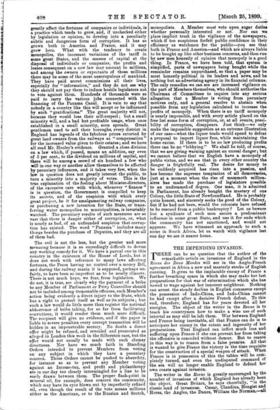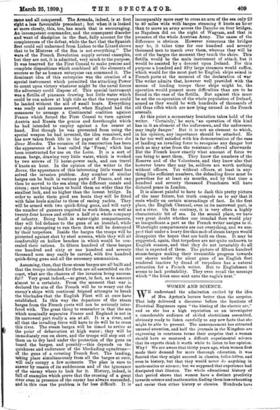THE IMPENDING INVASION.
THERE can be no question that the author of the remarkable article on invasions of England in the Revue des Deux Afondes will see in the Anglo-French agreement in Africa a new and masterly stroke of English cunning. It gives to the implacable enemy of France a further breathing space in which she may make her last preparations for that war of extermination which she has vowed to wage against her innocent neighbour. Nothing can arrest the steady decline in English commerce except the possession of Indo-China, and Indo-China cannot be had except after a decisive French defeat. To this end, therefore, England has for years devoted all her energies. The object of the writer in the Revue is to teach his countrymen how to make a wise use of such interval as may still be left them. War between England and France being inevitable, all that France can do is to anticipate her enemy in the extent and ingenuity of her preparations. That England can inflict much loss and suffering upon France if she can prevent her from taking the offensive is conceded without demur. But to reason in this way is to reason from a false premiss. All that is wanted to give France the victory is the time requisite for the construction of a special weapon of attack. 'VVlieft France is in possession of this the tables will be coed- pletely turned, and even the undisputed command of the sea will no longer enable England to defend her own coasts against invasion. The writer in the Revue is greatly encouraged by the number of invasions of which England has already been the object. Great Britain, he says cheerfully; " is the classic land of invasions. Caasar, Claudius, Hengist and Horsa, the Angles, the Danes, William the Norman,—all came and all conquered. The Armada, indeed, is at first Sight a lees favourable precedent ; but when it is looked at more-closely, this, too, has much that is encouraging. An incompetent commander, and the consequent disorder and want of discipline in the fleet, fully account for the completeness of the defeat, while the fact that the Spanish fleet could sail unharmed from Lisbon to the Lizard shows that to be Mistress of the Sea is not everything." The wars of the French Revolution supply several examples, but they are not, it is admitted, very much to the purpose. It was reserved for the First Consul to make precise and complete dispositions which combined all the elements of success so far as human enterprise can command it. The dominant idea of this enterprise was the creation of a special instrument which permitted the attacking Power to count upon victory whatever might be the naval forces the adversary could dispose of. This special instrument was a flotilla of pinnaces drawing but little water which could be run ashore at high tide so that the troops could be landed without the aid of small boats. Everything was ready and success assured, when England had the meanness to arrange a Continental coalition against France which forced the First Consul to turn against Austria and Russia the genius and forethought which he had intended to employ against a foe nearer at hand. But though he was prevented from using the special weapon he had invented, the idea remained, and has now taken fresh life in the paper of the Revue des Deux Mondes. The occasion of its resurrection has been the appearance of a boat called the which has been constructed for use on the Loire. It is a sort of steam barge, drawing very little water, which is worked by two screws of 75 horse-power each, and can travel 8 knots an hour. In the opinion of the writer in the Revue, the appearance of this interesting little vessel has solved the invasion problem. Any number of similar barges can be built in various parts of France, and can then be moved to the sea along the different canals and rivers ; care being taken to build them no wider than the smallest lock, and no higher than the lowest bridge. In order to make them good sea boats they will be fitted with false keels similar to those of racing yachts. They will be armed with two quick-firing guns, and will carry the number of gunners required to work them, as well as twenty-four horses and either a half or a whole company of infantry. Being built in water-tight compartments, they will bid defiance to the guns of an ironclad, while any ship attempting to run them down will be destroyed by their torpedoes. Inside the barges the troops will be protected against shot by steel screens, while they will sit comfortably on hollow benches in which would be con- cealed their rations. In fifteen hundred of these barges one hundred and sixty or one hundred and seventy thousand men may easily be carried, with five hundred quick-firing guns and all the necessary ammunition.
Assuming, then, that these steam barges are all built and that the troops intended for them are all assembled on the coast, what are the chances of the invasion being success- ful ? Very great indeed,—so great, in fact, as to amount almost to a certainty. From the moment that war is declared the aim of the French will be to weary out the enemy's ships with continual feigned attempts to break the blockades that the English Fleet will at once have established. In this way the departure of the steam bargee from the French ports will not be seriously inter- fered with. The great thing to remember is that the sea which nominally separates France and England is not in its narrowest part really a sea at all. It is a river, and all that the invading force will have to do will be to cross this river. The steam barges will be timed to arrive at the point of debarcation at high water ; they will be immediately run on shore, and the troops will step out of them on to dry land under the protection of the guns on board the barges, and possibly—this depends on the quickness and endurance of the blockading squadrons— of the guns of a covering French fleet. The landing, taking .place simultaneously from all the barges at once, will only occupy a few moments. The plan is sure to answer by reason of its suddenness and of the ignorance of the enemy where to look for it. History, indeed, is full of examples which prove that the crossing of a great river even in presence of the enemy has always succeeded, and in this case the problem is far less difficult. It is incomparably more easy to cross an arm of the sea only 20 to 40 miles wide with barges steaming 8 knots an hour than to move an army across the Danube on four bridges, as Napoleon did on the night of Wagram, and that in presence of the whole Austrian Army. The cause of the difference is obvious. However numerous the bridges may be, it takes time for one hundred and seventy thousand men to march over them, whereas they will be out of the barges the moment they touch the shore. This flotilla would be the main instrument of attack, but it would he assisted by a descent upon Ireland. For this purpose a hundred and fifty large steamers would suffice, which would for the most part be English ships seised in French ports at the moment of the declaration of war The writer admits that, however well provided with the means of landing troops these ships might be, the operation would present more difficulties than are to be found in the case of the flotilla. But against this must be set the co-operation of the whole population of Ireland, armed as they would be with hundreds of thousands of old Gras rifles which are now lying unused in the French arsenals.
At this point a momentary hesitation takes hold of the writer. ' Certainly,' he says, an operation of this kind has in it an element of the unforeseen, and the unforeseen may imply danger.' But it is not an element to which, in his opinion, any importance should be attached. He is far too well satisfied with his demonstration of the ease of landing an invading force to recognise any danger but such as may arise from the resistance offered afterwards But the French know exactly what amount of force we can bring to meet them. They know the numbers of the Reserve and of the Volunteers, and they know also that however brave they may be, soldiers are worth nothing without officers. Yet without officers, at least in any- thing like sufficient numbers, the defending force must be powerless for at least six months, and by that time a hundred and seventy thousand Frenchmen will have dictated peace in London.
It is almost painful to have to dash this pretty picture of the near future, but truth compels us to say that it rests wholly on certain misreadings of fact. In the first place, the English Channel, even in its narrowest part, is not a river. On the contrary, it is very often a highly characteristic bit of sea. In the second place, we have very great doubt whether our ironclad fleet would play so insignificant a part as the French writer assigns to it. Watertight compartments are not everything, and we sus- pe2t that under a heavy fire this mob of steam barges would disappoint the hopes that are built on them. It may be suggested, again, that torpedoes are not quite unknown to Euglish seamen, and that they do not invariably do all that is expected of them. The picture of fifteen hundred steam-barges making their irresistible progress towards our shores under the silent guns of an English fleet rendered inactive by dread of torpedoes has a natural attraction for a French writer. But to Englishmen it seems to lack probability. They even recall the message which " the kites once sent unto the eagle's nest."







































 Previous page
Previous page